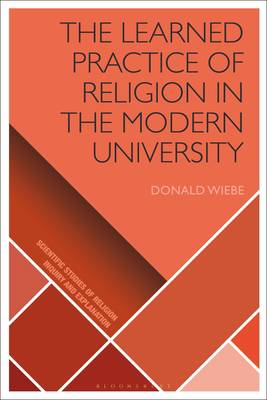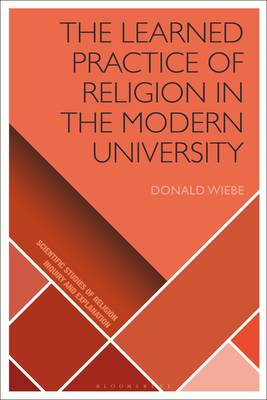
Bedankt voor het vertrouwen het afgelopen jaar! Om jou te bedanken bieden we GRATIS verzending (in België) aan op alles gedurende de hele maand januari.
- Afhalen na 1 uur in een winkel met voorraad
- In januari gratis thuislevering in België
- Ruim aanbod met 7 miljoen producten
Bedankt voor het vertrouwen het afgelopen jaar! Om jou te bedanken bieden we GRATIS verzending (in België) aan op alles gedurende de hele maand januari.
- Afhalen na 1 uur in een winkel met voorraad
- In januari gratis thuislevering in België
- Ruim aanbod met 7 miljoen producten
Zoeken
Omschrijving
In these essays, Donald Wiebe unveils a significant problem in the academic study of religion in colleges and universities in North America and Europe - that studies almost always exhibit a religious bias. To explore this issue, Wiebe looks at the religious and moral agendas behind the study of religion, showing that the boundaries between the objective study of religion and religious education as a tool for bettering society have become blurred. As a result, he argues, religious studies departments have fostered an environment where religion has become a learned or scholarly practice, rather than the object of academic scrutiny.
This book provides a critical history of the failure of 20th- and 21st-century scholars to follow through on the 19th-century ideal of an objective scientific study of religious thought and behaviour. Although emancipated from direct ecclesiastical control and, to some extent, from sectarian theologizing, Wiebe argues that research and scholarship in the academic department of religious studies has failed to break free from religious constraints. He shows that an objective scientific study of religious thought and practice is not only possible, but the only appropriate approach to the study of religious phenomena.
This book provides a critical history of the failure of 20th- and 21st-century scholars to follow through on the 19th-century ideal of an objective scientific study of religious thought and behaviour. Although emancipated from direct ecclesiastical control and, to some extent, from sectarian theologizing, Wiebe argues that research and scholarship in the academic department of religious studies has failed to break free from religious constraints. He shows that an objective scientific study of religious thought and practice is not only possible, but the only appropriate approach to the study of religious phenomena.
Specificaties
Betrokkenen
- Auteur(s):
- Uitgeverij:
Inhoud
- Aantal bladzijden:
- 256
- Taal:
- Engels
- Reeks:
Eigenschappen
- Productcode (EAN):
- 9781350103436
- Verschijningsdatum:
- 14/11/2019
- Uitvoering:
- Hardcover
- Formaat:
- Genaaid
- Afmetingen:
- 156 mm x 234 mm
- Gewicht:
- 530 g

Alleen bij Standaard Boekhandel
+ 508 punten op je klantenkaart van Standaard Boekhandel
Beoordelingen
We publiceren alleen reviews die voldoen aan de voorwaarden voor reviews. Bekijk onze voorwaarden voor reviews.









